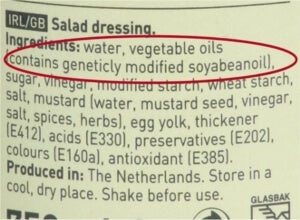
Okay, think fast: how often do you eat genetically modified foods? *buzzer* I’m sorry, but the answer we were looking for is: “no one knows!”. Current FDA regulations don’t require food companies in the United States to tell consumers when their products contain transgenic crops. Yet the large amount of GM corn and soy grown in the US mean that a high percentage (estimated at upwards of 60%) of processed foods contain GM products, or meat fed with GM grains. The Center for Food Safety, a non-profit organization, has issued a petition to the FDA to change their regulations and require all food containing genetically modified organisms (GMOs) to be clearly labeled. The petition legally requires a response from the FDA and is the first step towards suing the government. Watch the Center for Food Safety’s comedic commercial aimed at raising public awareness in the video below. The lack of labeling may have helped the US become the global center for GMO development, but it looks like advocacy groups and consumers are fed up with the secrecy surrounding how we are fed. GM food is poised to play a big role in 21st Century agriculture, but will the FDA keep consumers ignorant in order to make that happen?
The Center for Food Safety is one of the driving forces behind the Just Label It campaign which is petitioning the FDA to require GMO labeling. While humorous, the following video for the Just Label It campaign is clearly serious about getting consumers behind the petition:
Of course, the Center for Food Safety and the Just Label It campaign already claim that consumers are on their side. All of them. Well, 93% of them. Both sites are ripe with links to a plethora of polls from the last few years that show US consumers are overwhelmingly in favor of labels for genetically modified foodstuffs. I’m not a big proponent of polling, but I’m certainly willing to believe that a majority of Americans would like labels.
What would that affect? As we’ve discussed before, the US is the largest producer and consumer of genetically engineered foods. Many of these crops are developed so that they are resistant to herbicides, so that farmers can spray copious amounts of weed-killer on their fields and not kill the food. There are other GMOs that produce higher yields, or resist natural pests. There’s even a GM salmon that grows twice as fast as its natural cousin. Corn and soy are heavily dominated by GMOs, and the majority of those crops (in the US) go towards making livestock grain and high fructose corn syrup. Hence, a large portion of the processed food and meat eaten in the US is likely to contain or be affected by GMOs. But corn and soy are just the two largest of many varieties of GM produce the US grows including GM sugar beets, tomatoes, potatoes, papaya, and squash. We have 66.8 million hectares dedicated to growing GMOs, more than twice as much as the next largest source, Brazil. Labeling would impact a huge amount of the food you see in every grocery store (even the organic ones – GM crops are there too).

The reason why the US FDA has eschewed GMO labels is probably as simple as one word: Monsanto. One of the most prolific US developers of GMO intellectual property, Monsanto has over 5000 patents on its products. As we’ve discussed before, they are very aggressive at protecting their IP, going so far as to sue farmers who are accidentally contaminated by strains of their crops which are blown in from neighboring fields. It’s gotten to a point where non-Monsanto affiliated farmers are pre-emptively suing Monsanto just to gain some ground in the ongoing intellectual property lawsuits. In regards to labeling, Monsanto has maintained that their products have passed rigorous FDA safety requirements and that they are otherwise indistinguishable from natural strains of these foods. As true as that may be, decrying the need for labels seems like simply another calculated step by Monsanto and other GM developers to help grow the presence of GMOs in the agricultural industry. That the FDA has agreed with their position either shows that Big Agriculture has an undue influence on the agency, or that the science supports that conclusion. Either way, Monsanto and its cohorts have gotten their way so far and kept GMO labels off their goods.
Meanwhile, even a cursory glance at the team behind the Center for Food Safety and the Just Label It campaign reveals agricultural competitors to GMO developers. The major proponents of GMO labeling in these groups are companies (and organizations) that oppose the use of GMO foods entirely. Organic farming collectives, environmental groups, allergy advocates – it’s no surprise that the rhetoric on their sites isn’t demanding labels simply for the sake of consumer information, but because it fears GMO foods are actually a danger to humanity. These are the same groups that have been threatened by the rise of GMO agriculture, period.
It doesn’t take a cynic to look at the history of these two groups, the GMO developers like Monsanto, and the non-GMO agriculture advocates like the Center for Food Safety, and see this petition over GMO labels as just the latest round in an ongoing battle over who will control the agricultural industry in the United States. Weighing in on this issue is tantamount to wading into a quagmire of scientific and political debate the likes of which I have no interest in treading.
Luckily, the winner in this argument is so clear I don’t have to worry about politics: We should label GMOs. I don’t see why the FDA and GMO developers are fighting this. I believe in GMO technology. I think it’s one of the most likely paths to cheaply and securely feeding the world. While current incarnations of the technology are still far from perfect, a mature GMO industry may be able to design humanity with the organisms it needs to survive in the 21st Century.
But I still think GMOs should be labeled.
Why the hell not? Let consumers see the benefits of GM crops. Sure, some will definitely switch to competitors products because they are adverse to consuming new forms of food. That’s fine. If GM foods really are cheaper then many more consumers will choose them to save money. If GM foods aren’t cheap enough to compete with non-GMO foods, then their developers should go back to the drawing board and make GMOs that can compete. By keeping consumers in the dark we’re artificially stalling GMO science.
US developers may have been given a boost by being able to avoid GMO labels for the past 15 years, but it’s time we join the world on this one. The EU requires GMO labels, as does Russia, Japan, Australia, Brazil, and even China. Some countries, like Canada and Hong Kong just certify that companies who put “Non-GMO” labels on their food are telling the truth. One way or another, the US has to catch up. What are we so afraid of? US GMO products are sold in countries that require labels. Sold quite often. China imports an extraordinary amount of American GM corn seed. The US is at the top of the industry…and it needs to innovate to stay there. If Monsanto and other GMO companies artificially avoid meeting market demands then the aggressive development programs in Brazil and China will eventually overtake them. Compete or die, guys. Labels are ultimately good for your business!
And honestly, as much as I believe in biotechnology, I think consumers/citizens have a right to actively decide how much risk we take in developing new products. Some GMO animals (like the salmon) may be able to be isolated from the ecosystem, but GMO grains simply cannot be. They are in the shared environment and people have a right to vote with their money on how they feel about that. Transgenic contamination is a real concern, as are questions about long term health effects. Even China is taking a serious look at whether GMO crops are ready to be consumed on a large scale, or if the technology needs more work first. Again, avoiding informing consumers is just artificially delaying innovation in this field of science. What better GMOs might we create if we are rigorously pushed towards minimizing their environmental and medical impacts?
I just don’t know why this issue has been delayed for so long. Actually, I do, the GMO companies are almost certainly worried that consumer fears will hurt their sales, but that’s so short sighted! The human population is growing, United Nations projections have us expanding exponentially for decades to come. We going to need to feed billions more people, and that means improving agriculture. Personally I think GMOs are an important avenue to explore in that effort, and anything that hampers innovation is just dooming us to failure.
We can’t stagnate an entire industry just because we’re afraid of facing the market.
So, with the very large caveat that I support GMO technology contrary to the underlying interests of their partnered organizations, I’m coming out as in favor of the Just Label It campaign. If you agree, here’s a link to joining the petition. If you disagree, feel free to flame in the comments below.
Listen up, FDA. Information is always a good thing. Just Label It already.
[image credits: Food Freedom, injected corn by illuminating9_11 via Flickr, Pioneer]
[sources: Center for Food Safety, Just Label It, Reuters]



